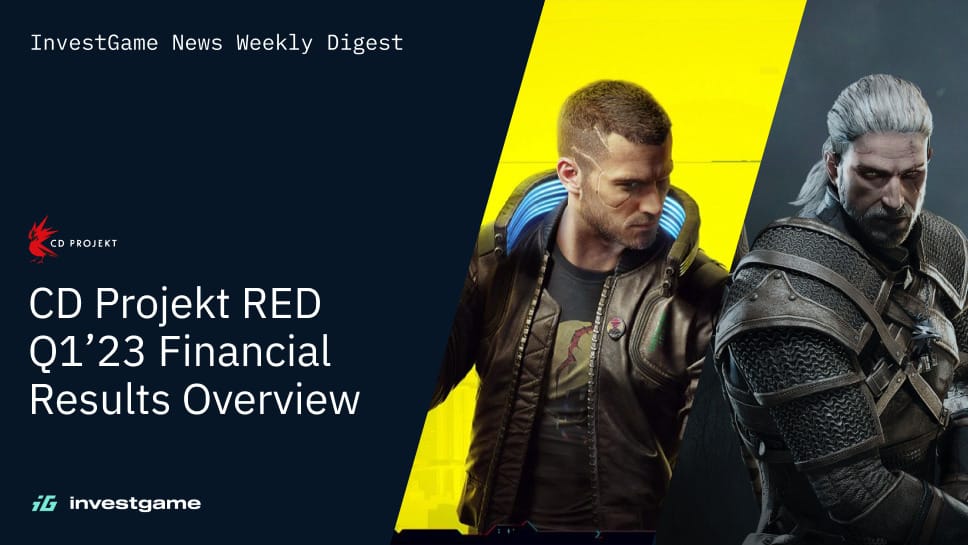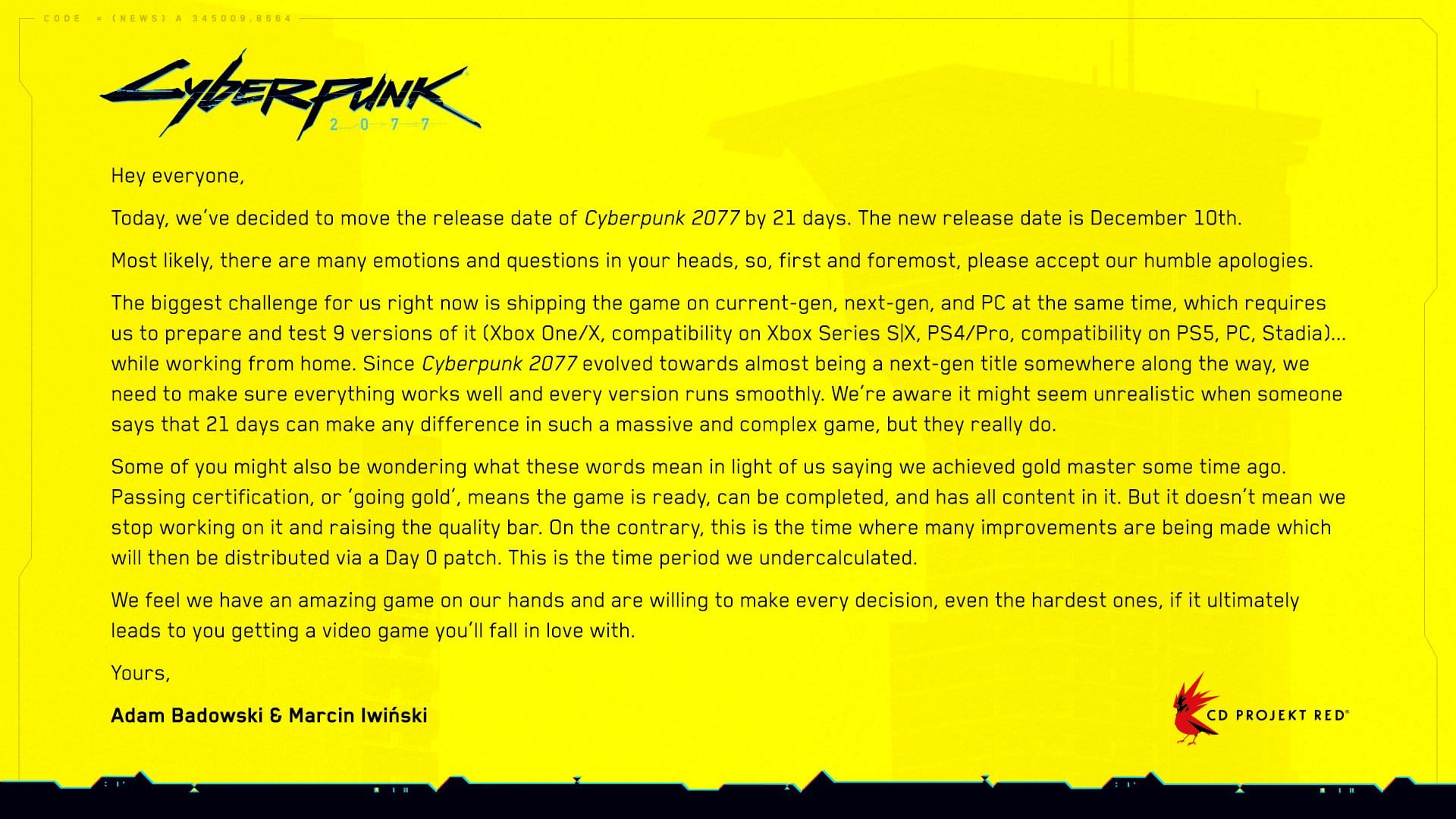Weekly News Digest #22

# of announced deals
8
announced deals’ size
$36.3m
# of closed deals
7

Hi all,
The investment activity remains weak, so this time we will not be analysing any big deal of the previous week. Instead, we will have a deep dive into the recent report of CD Projekt Red (WSE: CDR). We will go through the company’s financials, examine how two of its major IPs are doing lately and have a look at its transmedia activities.
CD Projekt RED Q1’23 Financial Results Overview
Financial Overview — Drop Before the Growth
First of all, let’s have a brief look at the company’s latest financial results. In Q1’23, CDPR generated around $39.8m Revenue (-24.2% YoY) and $17.1m EBITDA (-21.8% YoY). This drop may seem significant on paper, but the historical dynamic of the company’s financials shows that the company is used to reporting quite volatile numbers from quarter to quarter. Considering the rare releases of new titles — we saw a five-year gap between The Witcher 3and Cyberpunk 2077 — CDPR’s quarter-to-quarter is relying heavily on transmedia activity, as well as next-gen games upgrades and DLCs, which boost sales of the related titles. In this particular case, Q1’22 was the quarter when the next-gen upgrade for Cyberpunk 2077 came out, fixing many problems the game had at the start and significantly improving its graphics and performance on PS5 and Xbox Series X/S consoles.
Data source: CDPR Q1’23 Consolidated Report
In Q1’23, games sales constituted 75% of the total Revenue, with the top sources being:
— Sales of Cyberpunk 2077;
— Sales of The Witcher 3: Wild Hunt with Hearts of Stone and Blood and Wine expansions;
— Licence Revenue from CD PROJEKT RED studio franchises;
— Revenue related to other products of the CD PROJEKT RED segment: the GWENTgames: The Witcher Card Game, The Witcher 2: The Assassins of Kings, The Witcher and Thronebreaker: The Witcher Tales.
It is worth noticing that another 25% of the total Revenue comes from GOG store, which is a great asset to stabilize CDPR’s Revenue flow between the releases of its AAA titles.
However, the company is still heavily dependent on two of its latest games, The Witcher 3and Cyberpunk 2077. That is why, to better understand the company’s short-term future, we are going to examine each of the titles and then have a look at the company’s work with those IPs.
Cyberpunk 2077 — Record Past and Promising Future
Cyberpunk 2077, the second franchise of the Polish studio, played a very cruel joke on the company. The Revenue generated in Q4’20, when the game was released, turned out to be higher than the total Revenue the company saw during the five previous years! However, the poor technical condition of the game, especially on PS4 and Xbox One consoles, almost destroyed the developer’s reputation. Plummeting share price, law issues, and unprecedented refund policy from PlayStation — there was everything.
In 2023, however, the release state of Cyberpunk 2077 doesn’t look like something extraordinary. The famous ‘yellow letter’ by the company’s executive was just the beginning of an infamous trend we observe today. Halo Infinite, Battlefield 2042, Forspoken, Jedi: Survivor, and LOTR Gollum are just a few of the titles, which showed poor performance at the start followed by apology letters from the developers. As a result, many people start considering these letters to be a part of new marketing strategies.
Source: CD Projekt Red
Nevertheless, CDPR acknowledged its mistakes and promised to bring the game up to par. As of Jun’23, Cyberpunk 2077 has received a huge number of fixes and patches, showing a decent performance on every platform available. The additional interest to the game was fuelled by the anime series Cyberpunk: Edgerunners released on Netflix in Sep’22. The show received very positive feedback both from the audience and media and boosted the popularity of the IP.
Not all of the promises were fulfilled though. Initially, the company planned to release the first free DLC in the H1’22, but we didn’t see any of the free DLCs for the game yet. The first big add-on, called Phantom Liberty and featuring Hollywood star Idris Elba, is now planned to be released in 2023. The exact release date is expected to be revealed during Summer Games Fest this week. More than that, CDPR is now preparing a major Cyberpunk 2077 add-on with another Hollywood star and will start to work on a sequel (Project Orion) in 2024. Nonetheless, the company won’t release any paid DLCs, though there were such plans before the scandals around the release of the game.
After over 2.5 years since the release of the game, Cyberpunk 2077 is the best-performing title in terms of Revenue so far with over 20 million copies sold. Looking at how The Witcher 3 manages to keep being a good-selling game after so many years, we can expect the same long-term support for Cyberpunk 2077 in the future. Speaking of The Witcher, it’s time to dive deeper into the game’s recent performance.
The Witcher — Stable Revenue Source for Many Years
The Witcher 3: Wild Hunt is doing great. After the release of the updated version of the game for PS5 and Xbox Series X/S in Dec’22, total game sales surpassed a colossal number of 50 million copies. This makes The Witcher 3 the ninth best-selling game of all time. This achievement is especially significant since the game is purely a single-player experience. As for the whole game franchise, it has surpassed 75 million copies sold.
One of the keys to the success of The Witcher franchise is its transmedia approach and continuous development of the IP. In the graph we presented above you saw how the release of two seasons of The Witcher series on Netflix has positively influenced the Revenue flow of the company. The third season of the series is scheduled for release this month already.
However, the TV series still has its own problems. First, the main star of the show Henry Cavill will leave the TV series after season 3, and Liam Hemsworth would be taking over the role. What’s more, the first season of the spin-off series The Witcher: Blood Origin, releasedin Q4’22, received negative feedback from the audience. But The Witcher franchise development goes beyond the Netflix series.
In 2021, CDPR together with GO ON BOARD announced and released a board game The Witcher: Old World, which received mostly positive feedback from the audience.
In 2015, a real-life Witcher school live-action role-playing event was organized by 5 Elements in cooperation with CDPR. The event became annual and was closed in May’22 due to reasons unknown. During 7 years, the Witcher school attracted more than 3000 people, who were taught fencing, leatherwork, how to cast magical signs, and more.
In 2018, the Witcher for the first time appeared as a guest character in Soul Calibur VI. This year, Geralt of Rivia has appeared in Lost Ark and Fortnite as a playable character.
CDPR even made a try to expand in AR gaming with The Witcher Monster Slayer. However, the game was not able to attract enough audience and the company made a decision to close it by the end of Jun’23. According to AppMagic, the game has generated a total of $1.8m Revenue and 1.9 million installs.
Source: AppMagic
CDPR is currently working on several projects in the Witcher universe. The first one is a remake of the original Witcher. The second one is a spin-off of the series called Project Sirius. Finally, The Witcher 4, under the code name Polaris, is in development as well.
Considering the ever-growing development of The Witcher IP, we can expect more the similar activities for Cyberpunk 2077. In addition to The Witcher and Cyberpunk 2077 franchises, the studio started internal concept work on the third franchise under the code name Hadar. We don’t know anything about it so far but can expect more news in the future.
Two IPs Shaping the Future
CD Projekt Red is an example of how a gaming IP can evolve into a full multimedia experience. The Witcher, which began as a series of books by Polish author Andrzej Sapkowski, helped to establish the reputation for CDPR, and has expanded into a full entertainment IP, including TV shows, comics, and gaming. Cyberpunk 2077 is following a similar path — even the IP, though not as heavily, is based on a third-party franchise, a role-playing game by R. Talsorian Games. Despite initial challenges, the company has managed to overcome them through ongoing fixes and support for the game, attracting more players.
As a developer of AAA single-player games, the company is doing great, always fuelling interest in its franchises and attracting new players between the releases of new titles. Still, this business model suggests the majority of Revenue comes in the first few weeks after the release. That is why CDPR is considering the implementation of the multiplayer mode in its games and initially planned to start with Cyberpunk 2077, however, the current plans are unknown. And of course, it was a matter of time and growth before CDPR switched to parallel AAA games production.
Today, with several titles under development, the company might accelerate its growth and reach new heights. One of the main concerns though is that long production periods have always been compensated with the quality of games, especially when it comes to telling the stories. Moreover, some of the new games are being developed by the acquired companies, that never has never participated in development of the previous games.
So will the company manage to keep the same level of quality while speeding up and paralleling the development process with newly acquired companies? We never know, but let’s hope that the new Witcher games will not face the same criticism as the TV series faced.
We want to thank MGVC and The Games Fund for supporting this digest.
| NOTABLE TRANSACTIONS |
MERGERS & ACQUISITIONS
US-based esports organization FlyQuest has acquired Counter-Strike: Global Offensive and Valorant women’s rosters from US-based former women esports organization CLG Red. The latter was shut down in April earlier this year. The sum of the deal remained unknown. For FlyQuest this acquisition is an opportunity to increase its talent pool and add skillful and experienced gamers to its team
VENTURE FINANCING
US-based games developer Gardens has raised $12.25m out of $31.38m, according to the offering filing. The company is currently developing an online fantasy adventure game, the title of which remains undisclosed. The studio has previously raised $4.5m from Transcend Fund in 2021.
Australia-based Web3 games developer Illuvium has raised $10m in a Series A funding round led by its existing investor Framework Ventures. Illuvium is a developer of a set of eponymous interconnected F2P NFT games – Illuvium Arena, Illuvium Zero and Illuvium Overworld, each having a different gameplay and game mechanics, from turn-based strategy to action adventure. The funds will go to further development of the gaming ecosystem.
Singapore-based Web3 GameFi/NFT aggregator DeGame has raised $6.5m in a Series A funding round, led by Folius Ventures, Kenetic Capital and A&T Capital. NGC Ventures, Hack VC, HashKey Capital, Avalanche and several other investors also participated in the round. The platform allows GameFi projects to seek contributors and get necessary support, especially at the early-stages, to help those projects get momentum and make more people aware of its existence. The investment will go to creation and transition to the Proof-of-Contribution system, so that the users will be able to prove their contribution, and the projects will be able to verify it.
US-based esports and gaming organization M80 has raised $3m in a Seed funding round, led by Expert Dojo, VT Technology Ventures and Practical Venture Capital. The company will use the funds to expand its team as well as to launch its developer branch M80 Labs, which is engaged in creating digital goods and exploring Web3. M80 current esports disciplines are Rainbow Six Siege, Rocket League, Street Fighter, and Valorant.
Singapore-based Web3 platform MetaZone has raised $3m in a Seed funding round, led by Sfermion and CMT Digital, with participation from Tess Ventures, IOSG Ventures, IVC, Polygon Studios, MHC Digital, and LucidBlue Ventures. The company is developing a tokenized app platform for creating various usable metaverse objects and apps that can be purchased as NFTs, so-called METAs (Metaverse Enabled Tokenized Applications).
US-based PC game developer Proxima has raised $1.6m in a Seed funding round, led by London Venture Partners, with participation from Konvoy Ventures, Progression Fund, and Valhalla Ventures. The company’s first title is Lumari, a social sandbox adventure game for PC, which is currently in development.
India-based esports organization Revenant Esports has raised an undisclosed sum from Bollywood actor Tiger Shroff. The company is one of the leading esports teams in India with a vast experience across multiple esports disciplines. The strategic investment will be used to enhance the company’s bootcamp infrastructure and rosters, as well as to further develop its content creation.












